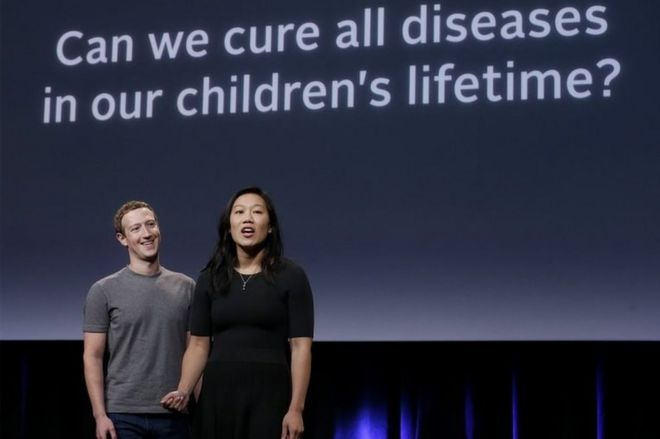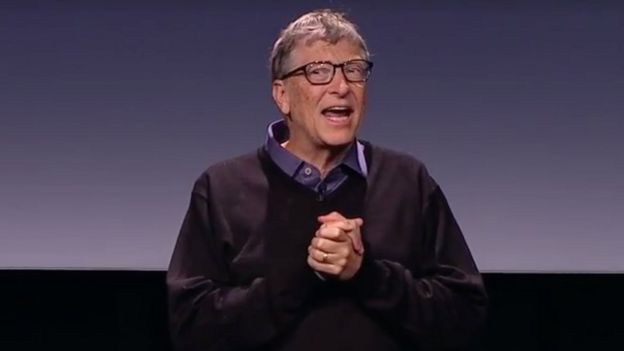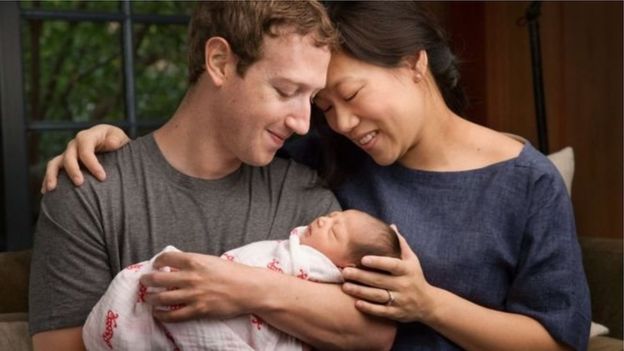- 21 September 2016
- Technology
-
(테크놀로지) 저커버그 부부 2100년까지 모든 질병을 치료 예방 관리하는데 기여하겠다과학과 테크놀로지/테크놀로지 2016. 9. 27. 12:01
출처: http://www.bbc.com/news/technology-37435425
Zuckerberg and Chan aim to tackle all disease by 2100 저커버그 부부 2100년까지 모든 질병을 치료, 예방, 관리하는데 기여하겠다
 AP
APPriscilla Chan was trained as a paediatrician 저커버그의 아내 프리스칠라 찬은 소아과의사로서 양성을 받은 사람이다. (paediatrician [|pi:diə|trɪʃn] 소아과의사) Facebook's founder Mark Zuckerberg and his wife Priscilla Chan have pledged $3bn (£2.3bn) to fund medical research over the next decade. 페이스북의 설립자 말크 저커버그와 아내 프리스칠라 찬은 다음 10년간 의학연구에 30억 달러(3조원 상당)를 지원하겠다고 약속했다.
At a press conference in San Francisco, they said their ultimate goal was to "cure, prevent or manage all diseases by the end of the century". 샌프란시스코 기자회견에서 부부는 자신들의 궁극적 목표는 이번 세기 말까지 지구상의 모든 질병을 치료, 예방, 관리하는 것이라 밝혔다.
The funds will be distributed by the Chan Zuckerberg Initiative, which they created in December 2015. 작년에 부부가 설립한 찬 저커버그 이니시에이티브가 필요한 자금을 기부하게 된다.
Tech leaders are increasingly turning their attention to health. 테크놀로지 기업가들이 점점 관심을 건강분야로 돌리고 있다.
Earlier in the week, Microsoft said it intended to "solve" cancer by using artificial intelligence tools. 금주초 마이크로소프트社는 인공지능도구들을 사용해 암을 "해결"하겠다는 의향을 밝힌 바 있다.
Google's DeepMind unit is working with the NHS to find a way to use computers to more accurately diagnose diseases. 구글의 딥인마이드는 질병을 더 정확하게 진단하기 위해 컴퓨터를 이용하는 방안을 알아보기 위해 NHS(National Health Service국민의료보험)와 협력하고 있다.
And IBM and MIT announced a tie-up earlier this week to develop AI-based systems that could help clinicians improve the care of elderly and disabled patients. IBM과 MIT는 의사들이 노인들과 신체장애자들을 더 잘 케어할 수 있도록 인공지능 시스템을 개발하고자 협업하겠다고 선언했다. (clinicians: 임상의(직접 환자를 상대하는 의사))
Even so, the Chan Zuckerberg plan is marked by its ambition.
 THINKSTOCK
THINKSTOCKAnalysis by James Gallagher, health and science reporter, BBC News
This is certainly an ambitious project, but is $3bn (£2.3bn) over the next decade enough to fulfil it?
One British charity - Cancer Research UK - is likely to spend more in that time on just one disease. Its research budget is currently $0.5bn (£404m) a year.
The Wellcome Trust - the world's biggest medical research charity - is investing significantly more: $6.5bn (£5bn) over the next five years.
And the US' medical research agency, the National Institutes of Health, spends a whopping $32.3bn (£25bn) every year.
There is no doubt that the Chan Zuckerberg Initiative could make a real impact - the Bill and Melinda Gates Foundation has given real impetus to eliminating malaria.
And advances in technology are transforming and accelerating medical research - for example, cancer drugs designed by artificial intelligence are showing success in clinical trials.
But curing, preventing or managing all disease remains a lofty and distant goal.
Biohub projects
Mr Zuckerberg said that at present 50 times more money was spent on treating people who are sick than on curing the diseases that would stop them getting ill in the first place, and added that this needed to change.
Mark Zuckerberg: "We all have an opportunity to leave the world a much better place than we found it." He outlined three principles that will guide the couple's investments:
- to bring scientists and engineers together
- to build tools and technology that advance research
- to grow the movement to fund more science around the world
Ms Chan added that they had already committed $600m to creating a new research centre called the Biohub, which will bring together engineers, computer scientists, biologists, chemists and other innovators.
The Biohub will initially work on two projects.
The first is the Cell Atlas, a "map" that describes the different types of cells that control the body's major organs.
The second is the Infectious Disease Initiative, which will try to develop new tests and vaccines to tackle HIV, Ebola, Zika and other new diseases.
Mr Zuckerberg predicted that by 2100 the average life expectancy would be beyond 100 years.
But he cautioned that it would take years before the couple's fund led to the creation of new medical treatments and further time before they could be applied to patients.
 FACEBOOK
FACEBOOKBill Gates said his hosts were making an "incredible commitment to research and development" Microsoft's co-founder Bill Gates - who has funded his own health research via the Bill & Melinda Gates Foundation - appeared at the event to praise the announcement.
He described it as "very bold and ambitious" but added that "we desperately need this science".
Long-term goals
Mr Zuckerberg and Ms Chan announced in December 2015 that they planned to give away 99% of their shares in Facebook to fund good causes following the birth of their daughter.
The organisation's stated mission is to make long-term investments in work that advances human potential and promotes equality.
 GETTY IMAGES
GETTY IMAGESMr Zuckerberg and Ms Chan set up their philanthropic company following the birth of their daughter Max They had previously announced investments in education-related start-ups.
One expert said that dealing with all disease was "clearly ambitious" but added that deep-pocketed philanthropists were defined by the fact they could take such risks.
"The Chan Zuckerberg announcement is unusual in size but is in keeping with trends amongst today's biggest donors who want to achieve transformational change, prefer funding prevention over cure and tend to invest in causes and organisations with which they have prior connections," commented Dr Beth Breeze, director of the centre for philanthropy at the University of Kent.
"Most donations reflect the 'philanthropic autobiography' of the donor and this is no exception.
"Chan is an alumna of the University of California, San Francisco.
"So, the couple will already know and trust the people who will spend the money.
"She is trained as a paediatrician and recently became a mother so is aligning her professional and personal experiences with her philanthropic priorities."
'과학과 테크놀로지 > 테크놀로지' 카테고리의 다른 글
(테크놀로지) "페트병 녹여 98% 수소로 전환" (2024.02.06/뉴스) (0) 2024.02.07 (테크놀로지) BBC: 왜 한국은 로보트 산업의 이상적인 배양지인가? (0) 2017.12.30 (테크놀로지) 야후 2년전 사용자 5억명의 개인정보 해킹 당했었다 (0) 2016.09.24 (테크놀로지) 영국정부 데이타 보안문제로 최근 감사보고서에서 두드려맞다 (0) 2016.09.23 (테크놀로지) 기계는 우리를 사이버 공격에서 지켜줄 수 있는가? (0) 2016.08.03